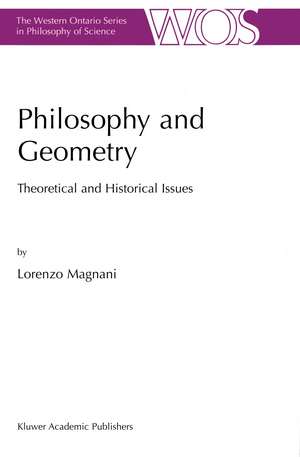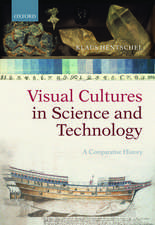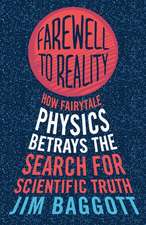Philosophy and Geometry: Theoretical and Historical Issues: The Western Ontario Series in Philosophy of Science, cartea 66
Autor L. Magnanien Limba Engleză Paperback – 30 noi 2001
Din seria The Western Ontario Series in Philosophy of Science
- 15%
 Preț: 632.70 lei
Preț: 632.70 lei - 18%
 Preț: 947.35 lei
Preț: 947.35 lei - 20%
 Preț: 583.95 lei
Preț: 583.95 lei - 18%
 Preț: 952.72 lei
Preț: 952.72 lei -
 Preț: 397.76 lei
Preț: 397.76 lei - 15%
 Preț: 644.49 lei
Preț: 644.49 lei - 18%
 Preț: 950.03 lei
Preț: 950.03 lei - 18%
 Preț: 953.82 lei
Preț: 953.82 lei - 15%
 Preț: 643.34 lei
Preț: 643.34 lei - 15%
 Preț: 648.05 lei
Preț: 648.05 lei - 18%
 Preț: 943.43 lei
Preț: 943.43 lei - 15%
 Preț: 646.11 lei
Preț: 646.11 lei -
 Preț: 386.22 lei
Preț: 386.22 lei -
 Preț: 393.52 lei
Preț: 393.52 lei - 15%
 Preț: 642.18 lei
Preț: 642.18 lei - 18%
 Preț: 950.33 lei
Preț: 950.33 lei - 18%
 Preț: 949.55 lei
Preț: 949.55 lei - 18%
 Preț: 1225.31 lei
Preț: 1225.31 lei - 18%
 Preț: 952.72 lei
Preț: 952.72 lei - 18%
 Preț: 952.89 lei
Preț: 952.89 lei -
 Preț: 393.52 lei
Preț: 393.52 lei - 18%
 Preț: 956.33 lei
Preț: 956.33 lei - 18%
 Preț: 953.97 lei
Preț: 953.97 lei - 18%
 Preț: 1225.62 lei
Preț: 1225.62 lei - 15%
 Preț: 641.20 lei
Preț: 641.20 lei -
 Preț: 384.86 lei
Preț: 384.86 lei - 18%
 Preț: 953.65 lei
Preț: 953.65 lei - 18%
 Preț: 1816.25 lei
Preț: 1816.25 lei
Preț: 560.01 lei
Preț vechi: 700.01 lei
-20% Nou
Puncte Express: 840
Preț estimativ în valută:
107.17€ • 111.48$ • 88.48£
107.17€ • 111.48$ • 88.48£
Carte tipărită la comandă
Livrare economică 11-17 aprilie
Preluare comenzi: 021 569.72.76
Specificații
ISBN-13: 9781402002410
ISBN-10: 1402002416
Pagini: 276
Ilustrații: XX, 256 p.
Dimensiuni: 155 x 235 x 14 mm
Greutate: 0.41 kg
Ediția:Softcover reprint of the original 1st ed. 2001
Editura: SPRINGER NETHERLANDS
Colecția Springer
Seria The Western Ontario Series in Philosophy of Science
Locul publicării:Dordrecht, Netherlands
ISBN-10: 1402002416
Pagini: 276
Ilustrații: XX, 256 p.
Dimensiuni: 155 x 235 x 14 mm
Greutate: 0.41 kg
Ediția:Softcover reprint of the original 1st ed. 2001
Editura: SPRINGER NETHERLANDS
Colecția Springer
Seria The Western Ontario Series in Philosophy of Science
Locul publicării:Dordrecht, Netherlands
Public țintă
ResearchCuprins
1 At the Origins of Geometrical Knowledge.- 1. Conceptual space, mental spatial models, latent geometry.- 2. Figures, symbols, and the Greek origins of geometry.- 3. The ritual origin of geometry.- 2 Geometry: the Model of Knowledge.- 1. Sensibility.- 2. Imagination.- 3. Understanding.- 4. Pure apprehension and geometry.- 5. Empirical apprehension and empirical schematism.- 6. Geometrical schemata and constructions: models of philosophy.- 7. Space as the object of geometry.- 3 Constructions, Logic, Categories.- 1. Space and logic.- 2. Intuition, construction, and the logic of singular terms.- 3. Pure and applied geometry.- 4. Why is geometry synthetic?.- 5. Categories and Axioms of Intuition.- 6. Mathematical schematism.- 4 The ???????? in Ancient Geometrical Knowledge.- 1. Geometry, drawing, and writing.- 2. Mathematical objects.- 3. Geometrical reasoning.- 4. The science that studies shapes: geometry.- 5. “History of geometry” and “elements” of geometry.- 5 Geometry and Convention.- 1. Crude facts, relations, conventions.- 2. Pure and applied geometry.- 3. Sensible, geometric, and physical space.- 4. Geometrical intuition.- 5. Geometrical apriorism and empiricism.- 6. The genesis of geometry.- 7. The interchangeability of geometries.- 8. Withdrawing conventions.- 9. Withdrawing principles of coordination.- 6 Geometry, Problem Solving, Abduction.- 1. Geometrical constructions and problem solving.- 2. Model-based and manipulative abduction.- 3. Geometrical construction is a kind of manipulative abduction.- 4. Diagrams, abduction, and deductive reasoning.- 7 Geometry and Cognition.- 1. Geometry of visibles, protogeometry, manipulations.- 2. At the origins of geometrical knowledge II.- 3. Non-conceptual and spatial abilities.- 4. Computational geometricalconstructions.- 5. Spatial imagery.- 6. Logical models of diagrammatic reasoning.- References.- Author Index.
















